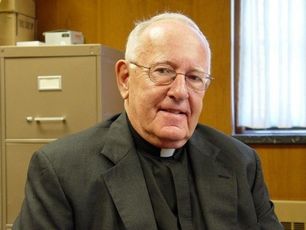Local Vatican Expert: Pope Stepping down "Unprecedented"
By Laura Dolce
When Pope Benedict XVI announced Monday that he would be retiring at the end of the month, he may have caught the world by surprise, but for Maine's Monsignor Charles Murphy, there were signs more than a year ago that the pope was struggling. “I saw him last in December 2011 and his walk was very impaired,” said Murphy, director of deacons for the Archdiocese of Portland and the author of several books, including The Spirituality of Fasting and Eucharistic Adoration. “He had to be wheeled around. But mentally, he was very sharp.” Murphy, who spent more than a decade of his life in Vatican City, first as a student from 1958 to 1962, and then as rector of the North American College for seminarians from 1978 to 1985, visits each year and said Benedict's stepping down was “unprecedented.” “John Paul II wouldn't, even with advanced Parkinson's,” he said. “He'd say, 'Do you ask the father of the family to retire?'” Benedict, Murphy said, was “more realistic.” Chosen to serve as an “interim” pope following the long term of John Paul II, he understood that his role was to give the cardinals a chance to “regroup and rethink.” At nearly 86, Benedict has served for nearly eight years and during that time has grown increasingly frail. He was elected pontiff in 2005 after the death of Pope John Paul II. Before that, though, he was a cardinal, and it was then that Murphy got to know Benedict when he asked him to speak to his seminary students. “He would give seminars at my college,” Murphy said. “We had a lot of conversations. I would pick him up in my car and drive him.” Later, he said, when Benedict was called upon to work on the “Catechism of the Catholic Church,” some 20 years ago, he invited Murphy to work on it as well. Still, Murphy was shocked when Benedict was chosen as the new pope. “He was a surprise choice,” he said. “He was a scholar, not a 'media star.'” He has remained that as pope, Murphy said, calling Benedict “gentle,” “smiling” and “genuine.” “He didn't change who he was,” he said. On Monday he became the first pope in nearly 600 years to step down from the post. “He gave two weeks' notice – almost no notice,” Murphy said, adding that the cardinals certainly didn't see the announcement coming. The cardinals are likely to hold an enclave in March, almost immediately after Benedict steps down Feb. 28. And while in some ways Benedict has made replacing him easier, naming more cardinals until the total stands at 124, almost the maximum, Murphy said, in other ways he's made it tougher as well. Benedict overturned a John Paul II decree that only a simple majority was needed to elect the pope if, after five votes, two thirds of the voting cardinals could not agree, Murphy said. Today, a two thirds majority is needed to elect a pope. Once Benedict steps down, Murphy said the cardinals will be called to Vatican City for the enclave, which takes behind closed doors. All cardinals under the age of 80 are eligible to vote – and to be named pope, although running for the job isn't allowed. “You are forbidden to campaign,” Murphy said. “You can sound each other out on views.” That's how Benedict, then Cardinal Joseph Ratzinger, found himself elected, Murphy said. “He gave a very powerful address and the cardinals loved his message,” he said. “It catapulted him into the papacy.” While in the past the cardinals would be locked in a room in Vatican City until a pope was chosen things are a little more comfortable today. “It used to be cramped and uncomfortable,” Murphy said. “Now they have a hotel – there used to be bunk beds.” Murphy said the cardinals vote twice a day until a pope is chosen, casting paper ballots that are burnt after each vote. Black smoke means the cardinals couldn't agree; white that a pope has been chosen. There may not be an obvious frontrunner for the papacy yet, Murphy said, and while Benedict was the second non-Italian pope in recent years, he wouldn't be surprised to see another follow, perhaps from either Latin America or Africa, the fastest-growing Catholic centers in the world. Whoever is chosen, though, Murphy said there's nothing like the feeling of standing in St. Peter's Square and seeing the white smoke rise and hearing the announcement: we have a new pope. Murphy was there to hear John Paul II named, and plans to return to Vatican City soon, perhaps for Easter. By then, he said, there will be a new pope and new aides in place. “There will be a new regime,” he said. Contact: ldolce@seacoastonline.com
|
.
Any original material on these pages is copyright © BishopAccountability.org 2004. Reproduce freely with attribution.
